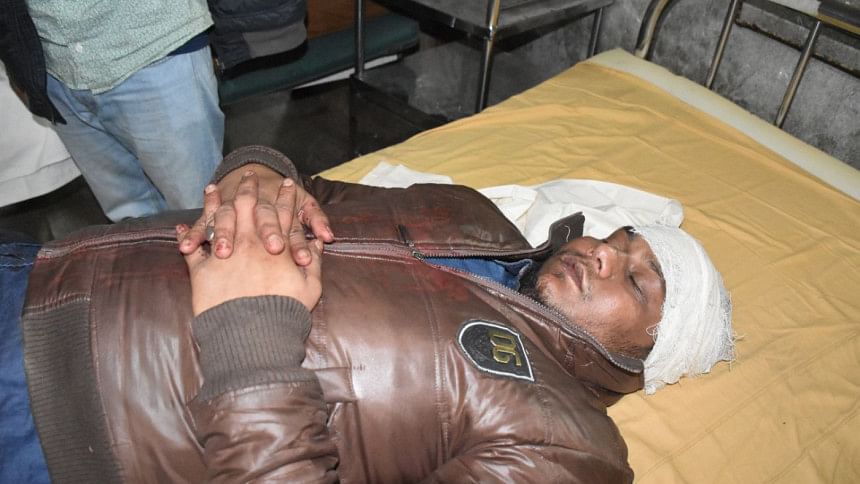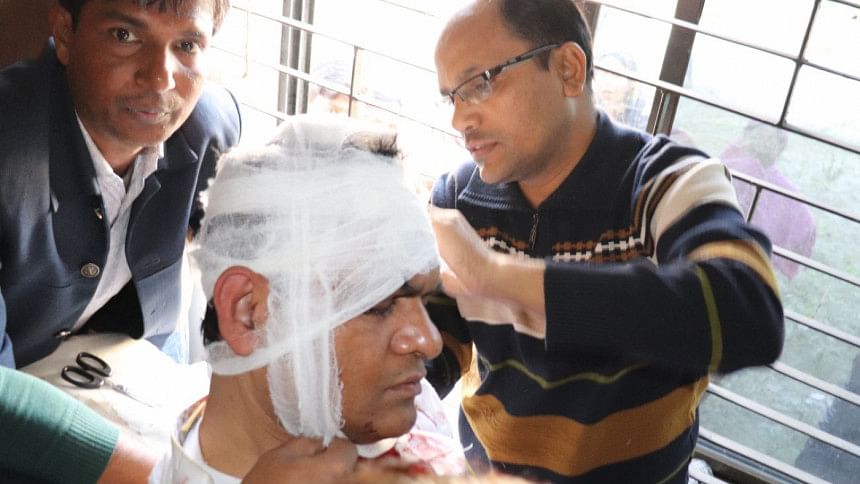Picking a comparatively new face for Jhalakathi-2 and attacks on the candidate have hampered the BNP's election campaign in the constituency, comprising Sadar and Nalchity upazilas.
The party also has to deal with a controversy over the role of the contender's father in the 1971 Liberation War.
The candidate -- Zeeba Amina Khan -- will vie with an Awami League heavyweight, Industries Minister Amir Hossain Amu, in the December 30 polls.
Amu is criticised for not keeping in touch with the voters, said locals, adding that he would also have to face their anti-incumbency sentiments.
However, the AL is vigorously campaigning on his behalf.
Visiting different areas of Sadar and Nalchity upazilas on Monday, The Daily Star correspondents saw AL leaders and activists conducting electioneering, using megaphones, holding rallies and bringing out processions. AL posters were seen hung almost everywhere.
In a sharp contrast, a district BNP office was found locked and only a few posters of its nominee were seen.
"There were [BNP] posters in some areas of the town, but those were torn down. However, nothing will stop the BNP [from winning] here. It is waiting for the right time to get on the ground and campaign," said a party supporter in front of the office.
Monirul Islam Nupur, general secretary of Jhalakathi BNP, said they were not being able to campaign properly due to "repeated attacks on our candidate by Awami League men".
Alleged Chhatra League and Jubo League men attacked the motorcade of Zeeba on December 13. The BNP leaders and activists came under another attack the same day when they went to the Returning Officer's Office to lodge a complaint.
A similar attack took place in Nalchity two days later, Nupur said.
"Jhalakathi is a BNP stronghold. If we can cast votes freely until noon [on the voting day], we will win," he told The Daily Star.
After restoration of democracy in 1991, the BNP won in the constituency twice, the Jatiya Party once and Amu thrice (uncontested in 2014 and in bi-polls in 2000).
This time, the BNP had initially fielded Israt Sultana Elen Bhutto, an ex-MP, as its candidate but later nominated Zeeba, a member of the party's central executive committee.
The change came following demands by some local party leaders, who said Bhutto maintained no contacts with the voters in the last 10 years, said party sources.
Asked whether there was any division within the party over the candidate, Nupur said, "We all are united for the restoration of democracy. Bhutto will also join the campaign soon."
Another BNP leader, wishing anonymity, said they were facing difficulties as Zeeba was comparatively a new face. Besides, Bhutto used to get strong support from her upazila, Nalchity.
Amu and Zeeba are both from Sadar upazila.
The AL and its front organisations in the district denied the allegations and blamed BNP's internal conflict for the attacks.
Khan Saifullah Panir, general secretary of Jhalakathi AL, claimed they were getting good response from the voters.
He also said the BNP fielded a "daughter of a Razakar" and people would not vote for her.
On Amu being “aloof” from the voters, he said, "Amu comes to his constituency more than any other central leader of other areas and keeps a close contact with the people."
ZEEBA'S FATHER
Dulal Saha, former deputy commander of Bangladesh Muktijoddha Sangsad in Jhalakathi, alleged that Zeeba's father Akhter Uddin Ahmed was a Muslim League leader and he worked against the Liberation War.
Akhter was a member of AM Malik's cabinet in 1971.
"He fled the area after the war and went to Saudi Arabia via Pakistan," added Dulal, also an adviser to the Jatiya Samajtantrik Dal central committee.
He said the Muktijoddha Sangsad of Jhalakathi in 2012 had sent a list of Razakars and other Pakistani collaborators to the International Crimes Tribunal. Akhter was named in the list, he said.
"As a freedom fighter, I can't accept the BNP's decision to field the daughter of anti-liberation person," he added.
Speaking to The Daily Star over phone on Monday, Zeeba said her father was not an "anti-liberation element". She said her father became a member of the AM Malek cabinet "to ensure security of the people".
Insisting that her father did not commit any crimes, Zeeba claimed that he got general amnesty declared by the Bangabandhu administration after the war.
According to records, out of 37,000 people sent to jail on charges of collaborating with the enemy, about 26,000 were freed following the amnesty declared on November 30, 1973.
Zeeba claimed that her father had been in Bangladesh until 1974.



 For all latest news, follow The Daily Star's Google News channel.
For all latest news, follow The Daily Star's Google News channel. 


